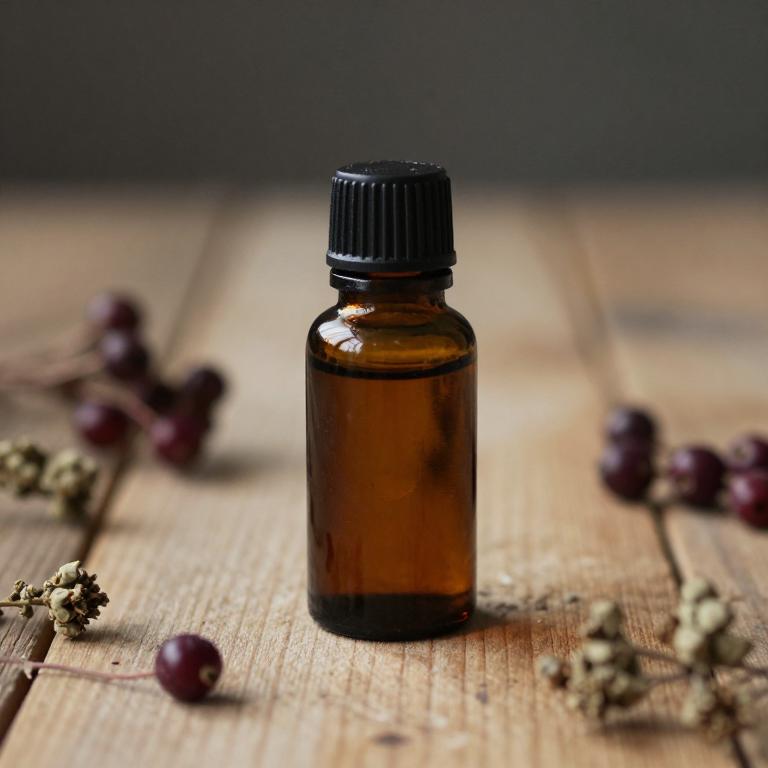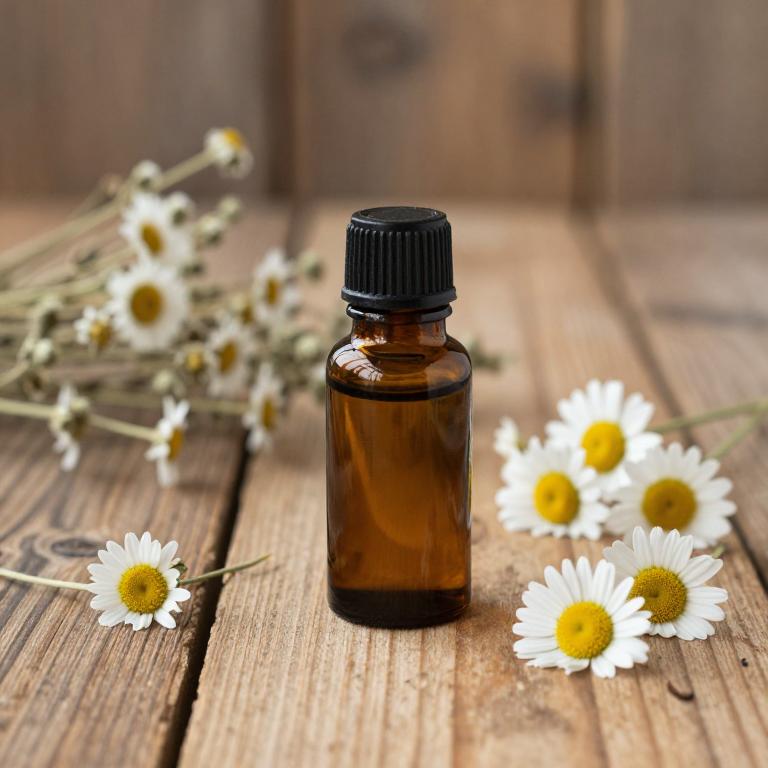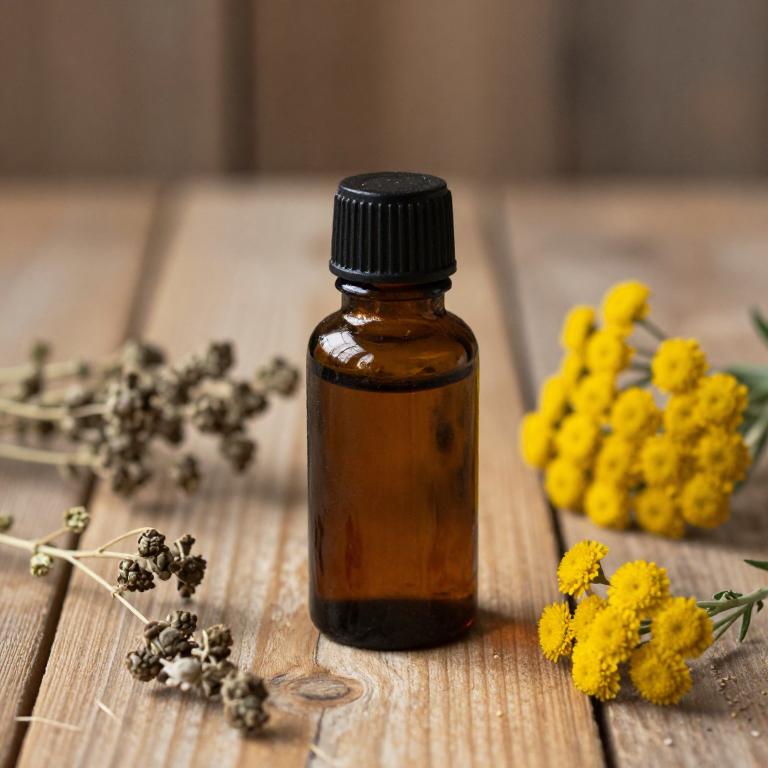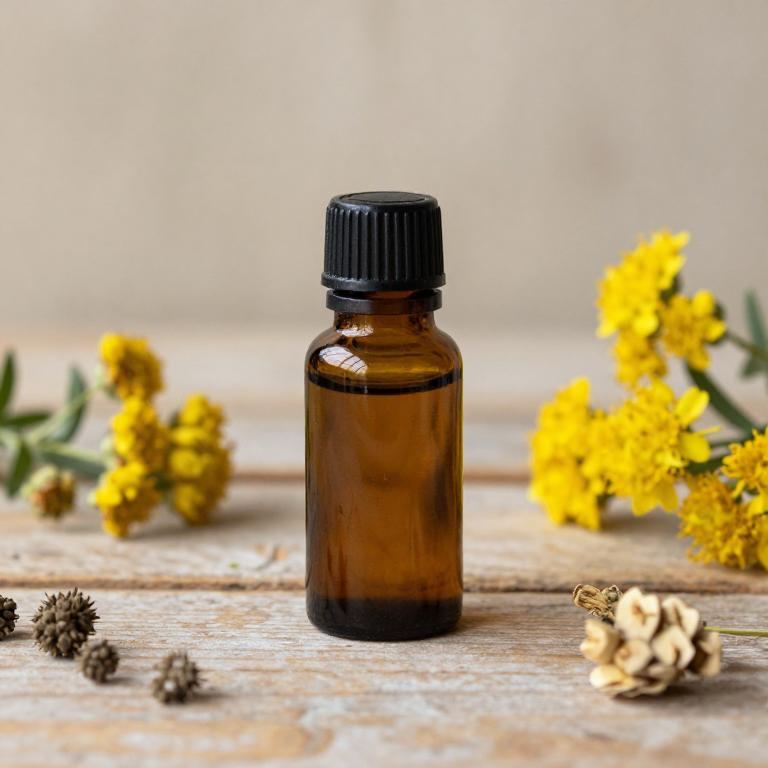10 Best Herbal Essential Oils For Bruises

Herbal essential oils, such as lavender, rosemary, and arnica, are commonly used for their potential healing properties when applied to bruises.
These oils are believed to promote circulation, reduce inflammation, and speed up the recovery process by stimulating the body's natural healing mechanisms. When diluted properly with a carrier oil, they can be safely applied to the affected area to alleviate pain and discomfort associated with bruising. However, it is important to perform a patch test first to avoid any allergic reactions.
While they may offer some benefits, they should not replace professional medical advice, especially for severe or persistent bruises.
Table of Contents
- 1. Dog rose (Rosa canina)
- 2. Chamomile (Matricaria chamomilla)
- 3. Chaste tree (Vitex agnus-castus)
- 4. Stinging nettle (Urtica dioica)
- 5. Yarrow (Achillea millefolium)
- 6. Turmeric (Curcuma longa)
- 7. St. john's wort (Hypericum perforatum)
- 8. Thistle (Silybum marianum)
- 9. English lavender (Lavandula angustifolia)
- 10. Ginger (Zingiber officinale)
1. Dog rose (Rosa canina)

Rosa canina, also known as rosehip, is a traditional herbal remedy that has been used for centuries to support skin health and healing.
Its essential oils, derived from the seeds and fruits of the rosehip plant, are rich in bioactive compounds such as vitamins A and C, antioxidants, and essential fatty acids. These properties make Rosa canina essential oils particularly effective in reducing inflammation and promoting the repair of damaged tissues, including those affected by bruises. When applied topically, the oils can help alleviate pain, reduce swelling, and accelerate the recovery process.
However, it is important to dilute the essential oils properly before use to avoid skin irritation and ensure safe application.
2. Chamomile (Matricaria chamomilla)

Matricaria chamomilla, commonly known as chamomile, is a widely used herb in aromatherapy and natural medicine for its calming and anti-inflammatory properties.
The essential oil extracted from its flowers contains compounds such as bisabolol and chamazulene, which are known for their ability to reduce swelling and promote healing. When applied topically, chamomile essential oil can help alleviate the pain and discoloration associated with bruises by improving circulation and reducing inflammation. It is often diluted with a carrier oil before use to prevent skin irritation.
Due to its soothing effects, chamomile essential oil is a popular choice for those seeking natural remedies for minor injuries and bruising.
3. Chaste tree (Vitex agnus-castus)

Vitex agnus-castus, also known as chasteberry, is a traditional herb that has been used for centuries for its potential therapeutic properties.
While it is primarily known for its use in women’s health, some sources suggest that its essential oils may have anti-inflammatory and circulatory benefits. These properties could potentially support the healing process of bruises by reducing swelling and promoting blood flow. However, it is important to note that there is limited scientific evidence specifically supporting the use of vitex essential oils for bruises.
As with any herbal remedy, it is advisable to consult with a healthcare professional before using vitex agnus-castus essential oils for therapeutic purposes.
4. Stinging nettle (Urtica dioica)

Urtica dioica, commonly known as stinging nettle, contains essential oils that have been traditionally used for their anti-inflammatory and healing properties.
These oils can help reduce swelling and pain associated with bruises by promoting circulation and accelerating tissue repair. When applied topically, the essential oils from Urtica dioica may soothe the skin and alleviate discomfort from minor injuries. However, it is important to dilute the oil properly before use to avoid skin irritation.
While some studies suggest potential benefits, more research is needed to fully understand its efficacy for treating bruises.
5. Yarrow (Achillea millefolium)

Achillea millefolium, commonly known as yarrow, is a traditional herb that has been used for centuries to support healing and reduce inflammation.
Its essential oil, derived from the plant's flowers and leaves, contains compounds such as chamazulene and bisabolol, which possess anti-inflammatory and analgesic properties. When applied topically, yarrow essential oil can help reduce the appearance of bruises by promoting circulation and accelerating the breakdown of hemoglobin. It is often diluted with a carrier oil before application to avoid skin irritation.
Due to its soothing and healing qualities, achillea millefolium essential oil is a popular choice in natural remedies for bruising and minor injuries.
6. Turmeric (Curcuma longa)

Curcuma longa, commonly known as turmeric, is a well-known herb that contains curcumin, a compound with potent anti-inflammatory and antioxidant properties.
Essential oils derived from Curcuma longa are often used in aromatherapy and topical applications to support the healing of bruises by reducing inflammation and promoting circulation. These oils can be diluted with a carrier oil and applied directly to the affected area to help alleviate pain and speed up recovery. The anti-inflammatory effects of curcuma essential oil may also help in reducing the appearance of bruising over time.
While it is generally considered safe for external use, it is important to consult a healthcare professional before using it on open wounds or for prolonged periods.
7. St. john's wort (Hypericum perforatum)

Hypericum perforatum, commonly known as St. John's Wort, is a plant traditionally used for its medicinal properties, and its essential oils have been explored for their potential benefits in treating bruises.
The essential oils derived from Hypericum perforatum contain compounds such as hypericin and flavonoids, which may possess anti-inflammatory and antioxidant properties that could aid in the healing process of bruises. When applied topically, these essential oils may help reduce swelling and promote tissue repair by enhancing blood circulation and reducing oxidative stress. However, it is important to note that while some preliminary studies suggest potential benefits, more research is needed to fully understand its efficacy and safety for this specific use.
As with any herbal remedy, it is advisable to consult a healthcare professional before using Hypericum perforatum essential oils, especially if you are taking other medications or have underlying health conditions.
8. Thistle (Silybum marianum)

Silybum marianum, also known as milk thistle, is a herbal plant commonly used for its potential health benefits, including supporting liver function.
While it is primarily known for its seeds, some sources suggest that essential oils derived from the plant may offer additional therapeutic properties. These essential oils are believed to possess anti-inflammatory and antioxidant qualities, which could aid in the healing process of bruises by reducing swelling and promoting tissue repair. However, it is important to note that scientific research on the specific effects of Silybum marianum essential oils on bruises is limited.
As with any herbal remedy, it is advisable to consult a healthcare professional before using these oils, especially for individuals with existing medical conditions or those taking medications.
9. English lavender (Lavandula angustifolia)

Lavandula angustifolia, commonly known as English lavender, is widely used in aromatherapy for its calming and healing properties.
The essential oil derived from this plant is known for its anti-inflammatory and antiseptic qualities, making it beneficial for treating bruises. When applied topically, lavender essential oil can help reduce swelling and promote the healing of damaged tissues. It is often diluted with a carrier oil to avoid skin irritation and enhance absorption.
Regular use of lavender essential oil may also help alleviate pain and improve the overall appearance of bruised skin.
10. Ginger (Zingiber officinale)

Zingiber officinale, commonly known as ginger, contains essential oils that have been traditionally used for their anti-inflammatory and analgesic properties.
These essential oils, derived from the rhizome of the plant, include compounds like gingerol and shogaol, which are known to reduce swelling and pain associated with bruises. When applied topically, ginger essential oil can help improve circulation and accelerate the healing process of bruised tissues. However, it is important to dilute the oil with a carrier oil to prevent skin irritation.
Overall, zingiber officinale essential oils offer a natural and effective remedy for alleviating the discomfort and appearance of bruises.